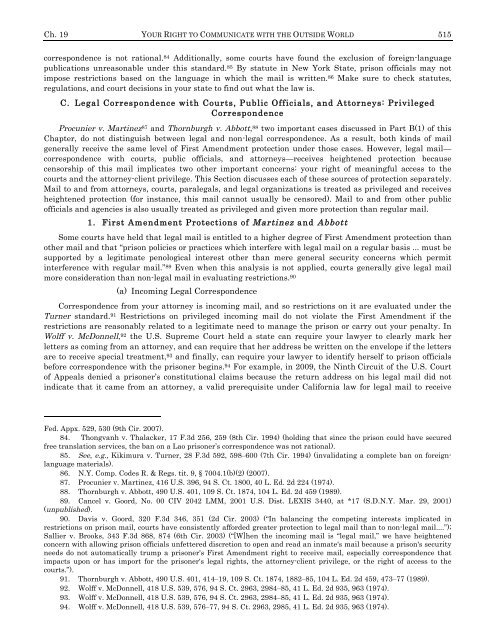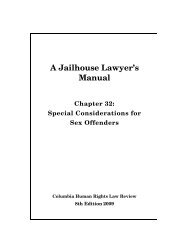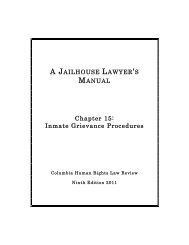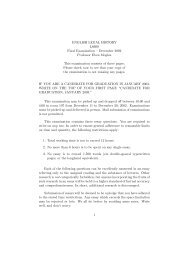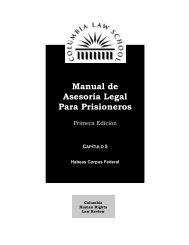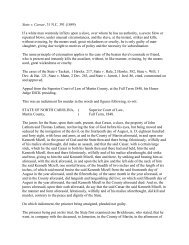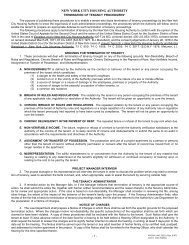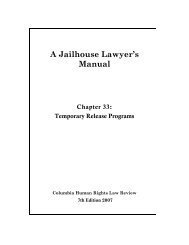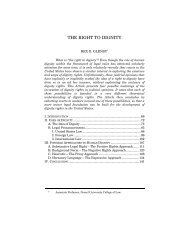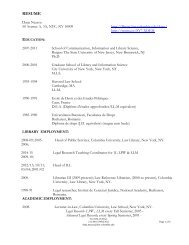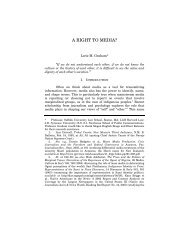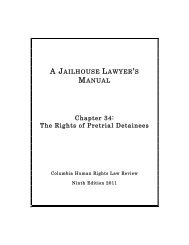Ch. 19 YOUR RIGHT TO COMMUNICATE WITH THE OUTSIDE WORLD 515correspondence is not rational. 84 Additionally, some courts have found <strong>the</strong> exclusion of foreign-languagepublications unreasonable under this standard. 85 By statute in New York State, prison officials may notimpose restrictions based on <strong>the</strong> language in which <strong>the</strong> mail is written. 86 Make sure <strong>to</strong> check statutes,regulations, and court decisions in your state <strong>to</strong> find out what <strong>the</strong> law is.C. Legal Correspondence with Courts, Public Officials, and At<strong>to</strong>rneys: PrivilegedCorrespondenceProcunier v. Martinez 87 and Thornburgh v. Abbott, 88 two important cases discussed in Part B(1) of thisChapter, do not distinguish between legal and non-legal correspondence. As a result, both kinds of mailgenerally receive <strong>the</strong> same level of First Amendment protection under those cases. However, legal mail—correspondence with courts, public officials, and at<strong>to</strong>rneys—receives heightened protection becausecensorship of this mail implicates two o<strong>the</strong>r important concerns: your right of meaningful access <strong>to</strong> <strong>the</strong>courts and <strong>the</strong> at<strong>to</strong>rney-client privilege. This Section discusses each of <strong>the</strong>se sources of protection separately.Mail <strong>to</strong> and from at<strong>to</strong>rneys, courts, paralegals, and legal organizations is treated as privileged and receivesheightened protection (for instance, this mail cannot usually be censored). Mail <strong>to</strong> and from o<strong>the</strong>r publicofficials and agencies is also usually treated as privileged and given more protection than regular mail.1. First Amendment Protections of Martinez and AbbottSome courts have held that legal mail is entitled <strong>to</strong> a higher degree of First Amendment protection thano<strong>the</strong>r mail and that “prison policies or practices which interfere with legal mail on a regular basis ... must besupported by a legitimate penological interest o<strong>the</strong>r than mere general security concerns which permitinterference with regular mail.” 89 Even when this analysis is not applied, courts generally give legal mailmore consideration than non-legal mail in evaluating restrictions. 90(a) Incoming Legal CorrespondenceCorrespondence from your at<strong>to</strong>rney is incoming mail, and so restrictions on it are evaluated under <strong>the</strong>Turner standard. 91 Restrictions on privileged incoming mail do not violate <strong>the</strong> First Amendment if <strong>the</strong>restrictions are reasonably related <strong>to</strong> a legitimate need <strong>to</strong> manage <strong>the</strong> prison or carry out your penalty. InWolff v. McDonnell, 92 <strong>the</strong> U.S. Supreme Court held a state can require your lawyer <strong>to</strong> clearly mark herletters as coming from an at<strong>to</strong>rney, and can require that her address be written on <strong>the</strong> envelope if <strong>the</strong> lettersare <strong>to</strong> receive special treatment, 93 and finally, can require your lawyer <strong>to</strong> identify herself <strong>to</strong> prison officialsbefore correspondence with <strong>the</strong> prisoner begins. 94 For example, in 2009, <strong>the</strong> Ninth Circuit of <strong>the</strong> U.S. Cour<strong>to</strong>f Appeals denied a prisoner’s constitutional claims because <strong>the</strong> return address on his legal mail did notindicate that it came from an at<strong>to</strong>rney, a valid prerequisite under California law for legal mail <strong>to</strong> receiveFed. Appx. 529, 530 (9th Cir. 2007).84. Thongvanh v. Thalacker, 17 F.3d 256, 259 (8th Cir. 1994) (holding that since <strong>the</strong> prison could have securedfree translation services, <strong>the</strong> ban on a Lao prisoner’s correspondence was not rational).85. See, e.g., Kikimura v. Turner, 28 F.3d 592, 598–600 (7th Cir. 1994) (invalidating a complete ban on foreignlanguagematerials).86. N.Y. Comp. Codes R. & Regs. tit. 9, § 7004.1(b)(2) (2007).87. Procunier v. Martinez, 416 U.S. 396, 94 S. Ct. 1800, 40 L. Ed. 2d 224 (1974).88. Thornburgh v. Abbott, 490 U.S. 401, 109 S. Ct. 1874, 104 L. Ed. 2d 459 (1989).89. Cancel v. Goord, No. 00 CIV 2042 LMM, 2001 U.S. Dist. LEXIS 3440, at *17 (S.D.N.Y. Mar. 29, 2001)(unpublished).90. Davis v. Goord, 320 F.3d 346, 351 (2d Cir. 2003) (“In balancing <strong>the</strong> competing interests implicated inrestrictions on prison mail, courts have consistently afforded greater protection <strong>to</strong> legal mail than <strong>to</strong> non-legal mail....”);Sallier v. Brooks, 343 F.3d 868, 874 (6th Cir. 2003) (“[W]hen <strong>the</strong> incoming mail is “legal mail,” we have heightenedconcern with allowing prison officials unfettered discretion <strong>to</strong> open and read an inmate's mail because a prison's securityneeds do not au<strong>to</strong>matically trump a prisoner's First Amendment right <strong>to</strong> receive mail, especially correspondence thatimpacts upon or has import for <strong>the</strong> prisoner's legal rights, <strong>the</strong> at<strong>to</strong>rney-client privilege, or <strong>the</strong> right of access <strong>to</strong> <strong>the</strong>courts.”).91. Thornburgh v. Abbott, 490 U.S. 401, 414–19, 109 S. Ct. 1874, 1882–85, 104 L. Ed. 2d 459, 473–77 (1989).92. Wolff v. McDonnell, 418 U.S. 539, 576, 94 S. Ct. 2963, 2984–85, 41 L. Ed. 2d 935, 963 (1974).93. Wolff v. McDonnell, 418 U.S. 539, 576, 94 S. Ct. 2963, 2984–85, 41 L. Ed. 2d 935, 963 (1974).94. Wolff v. McDonnell, 418 U.S. 539, 576–77, 94 S. Ct. 2963, 2985, 41 L. Ed. 2d 935, 963 (1974).
516 A JAILHOUSE LAWYER’S MANUAL Ch. 19special treatment. 95 Wolff seems <strong>to</strong> imply that prison officials cannot read or censor correspondence withyour at<strong>to</strong>rney if <strong>the</strong>re is no suspicion that <strong>the</strong> correspondence is illegal, but this is not entirely clear. 96According <strong>to</strong> Wolff, a requirement that letters from an at<strong>to</strong>rney <strong>to</strong> a prisoner be opened by prison officialsonly in <strong>the</strong> presence of <strong>the</strong> prisoner may be more than what <strong>the</strong> Constitution demands. 97 Many courts,however, have since ruled that <strong>the</strong> prisoner must be present if <strong>the</strong> prison is opening his letters, or that <strong>the</strong>prisoner at least be given <strong>the</strong> opportunity <strong>to</strong> request such a safeguard. 98(b) Outgoing Legal CorrespondencePrisons cannot restrict correspondence sent <strong>to</strong> at<strong>to</strong>rneys unless <strong>the</strong> restriction fur<strong>the</strong>rs an important orsubstantial governmental interest. 99 Some courts have found that outgoing legal correspondence does notpresent <strong>the</strong> same security threat as non-legal correspondence, and so <strong>the</strong>re is minimal government interestin restricting it. 100 Letters <strong>to</strong> some government agencies, elected officials, and legal assistance and civilliberties groups enjoy <strong>the</strong> same protection as mail addressed <strong>to</strong> your at<strong>to</strong>rney. 101 Also, <strong>the</strong> government has aduty <strong>to</strong> provide indigent prisoners with stationery and a reasonable amount of postage for legal mail. 10295. See Paulino v. Todd, No. 08-16081, 2009 U.S. App. LEXIS 16789, at *1 (9th Cir. July 28, 2009) (unpublished).96. See Wolff v. McDonnell, 418 U.S. 539, 577, 94 S. Ct. 2963, 2985, 41 L. Ed. 2d 925, 963 (1974) (“As <strong>to</strong> <strong>the</strong> ability<strong>to</strong> open <strong>the</strong> mail in <strong>the</strong> presence of inmates, this could in no way constitute censorship, since <strong>the</strong> mail would not be read.Nei<strong>the</strong>r could it chill such communications, since <strong>the</strong> inmate's presence ensures that prison officials will not read <strong>the</strong>mail.”).97. Wolff v. McDonnell, 418 U.S. 539, 577, 94 S. Ct. 2963, 2985, 41 L. Ed. 2d 935, 963 (1974); see also Brewer v.Wilkinson, 3 F.3d 816, 825 (5th Cir. 1993) (holding “that <strong>the</strong> violation of <strong>the</strong> prison regulation requiring that a prisonerbe present when his incoming legal mail is opened and inspected is not a violation of a prisoner's constitutional rights.”).98. See Sallier v. Brooks, 343 F.3d 868, 874 (6th Cir. 2003) (reaffirming that an opt-in policy, where a prisoner had<strong>to</strong> request being present when legal mail was opened, is constitutional so long as <strong>the</strong> prisoner is given written notice ofit); Bach v. Illinois, 504 F.2d 1100, 1102 (7th Cir. 1974) (per curiam) (holding that because “prison officials in inspectingincoming mail outside <strong>the</strong> presence of an inmate are provided with an opportunity <strong>to</strong> obtain advanced warning ofpotential litigation which might involve <strong>the</strong> prison and, more significantly, could become privy <strong>to</strong> stratagems beingformulated between at<strong>to</strong>rney and client with regard <strong>to</strong> pending litigation,” <strong>the</strong> prisoner is entitled <strong>to</strong> be present during<strong>the</strong> opening of legal mail addressed <strong>to</strong> him). Later cases with similar holdings <strong>to</strong> Bach include Powells v. MinnehahaCounty Sheriff Dept., 198 F.3d 711, 712 (8th Cir. 1999); Fontroy v. Beard, 485 F. Supp. 2d 592, 593, 601 (E.D. Pa. 2007)(finding that a Pennsylvania policy allowing prison staff <strong>to</strong> open incoming legal mail outside prisoners’ presence isunconstitutional); and Kensu v. Haigh, 87 F.3d 172, 174 (6th Cir. 1996) (holding that a prisoner’s right <strong>to</strong> be presentduring opening of his legal mail extends <strong>to</strong> hand-delivered correspondence as well as correspondence received through<strong>the</strong> U.S. Postal Service). But see John v. New York City Dept. of Corr., 183 F. Supp. 2d 619, 627–29 (S.D.N.Y. 2002)(dismissing prisoner’s claim for denial of access <strong>to</strong> courts when prison officials opened mail outside his presence becausehe failed <strong>to</strong> prove ei<strong>the</strong>r that <strong>the</strong> officials acted “deliberately and maliciously” in doing so or that he suffered any injury).99. Procunier v. Martinez, 416 U.S. 396, 412–15, 94 S. Ct. 1800, 1811–12, 40 L. Ed. 2d 224, 239–42 (1974).100. See Cancel v. Goord, No. 00 Civ. 2042 (LMM), 2001 U.S. Dist. LEXIS 3440, at *17 (S.D.N.Y. Mar. 21, 2001)(unpublished) (finding that without more than general security interests, interference with outgoing legal mail isunconstitutional) (citing Davidson v. Scully, 694 F.2d 50, 53 (2d Cir. 1982)); Taylor v. Sterrett, 532 F.2d 462, 473–475,480 (5th Cir. 1976) (finding that censoring outgoing mail <strong>to</strong> at<strong>to</strong>rneys, <strong>the</strong> courts or <strong>to</strong> government agencies is notsignificantly related <strong>to</strong> <strong>the</strong> advancement of jail security and thus unconstitutional).; Palmigiano v. Travisono, 317 F.Supp. 776, 792 (D.R.I. 1970)) (holding that <strong>the</strong> reading of any outgoing mail violates <strong>the</strong> 1st Amendment unlesspursuant <strong>to</strong> a duly obtained search warrant).101. See Davidson v. Scully, 694 F.2d 50, 53–54 (2d Cir. 1982) (striking down regulation restricting outgoing mail<strong>to</strong> government agencies because “[i]f prison officials are able <strong>to</strong> deny inmates free access <strong>to</strong> public officials and agencies,<strong>the</strong> fundamental right [of access <strong>to</strong> <strong>the</strong> courts] is restricted just as surely as if <strong>the</strong> government denied prisoners access <strong>to</strong>traditional legal materials. In many cases an inmate's claim might be substantially fur<strong>the</strong>red by information or aidavailable through government agencies.”). But see O'Keefe v. Van Boening, 82 F.3d 322, 323 (9th Cir. 1996) (upholdingregulation treating grievance mail <strong>to</strong> state agencies as non-legal); Jackson v. Mowery, 743 F. Supp. 600, 606 (D. Ind.1990) (“[T]he legal mail protected by <strong>the</strong> Constitution extends only <strong>to</strong> safeguard communications between an inmate andhis at<strong>to</strong>rney, and [defendant] has no basis for his claim of interference with ‘legal mail’ <strong>to</strong> and from his family andfriends.”).102. See Bounds v. Smith, 430 U.S. 817, 824–25, 97 S. Ct. 1491, 1496, 52 L. Ed. 2d 72, 81 (1977) (stating that it is“indisputable that indigent inmates must be provided at state expense with paper and pen <strong>to</strong> draft legal documents withnotary services <strong>to</strong> au<strong>the</strong>nticate <strong>the</strong>m, and with stamps <strong>to</strong> mail <strong>the</strong>m”). But see Gaines v. Lane, 790 F.2d 1299, 1308 (7thCir. 1986) (citing Bach v. Coughlin, 508 F.2d 303, 307 (7th Cir. 1974)) (explaining that while prisoners have a right <strong>to</strong>access <strong>the</strong> courts, <strong>the</strong>y are not entitled <strong>to</strong> unlimited free postage, and prison officials can balance prisoners’ rights <strong>to</strong> use<strong>the</strong> mails against budgetary concerns); Chandler v. Coughlin, 763 F.2d 110, 114 (2d Cir. 1985) (finding that state is notrequired <strong>to</strong> provide indigent prisoners unlimited free postage, but only a “reasonably adequate” amount of postage for


